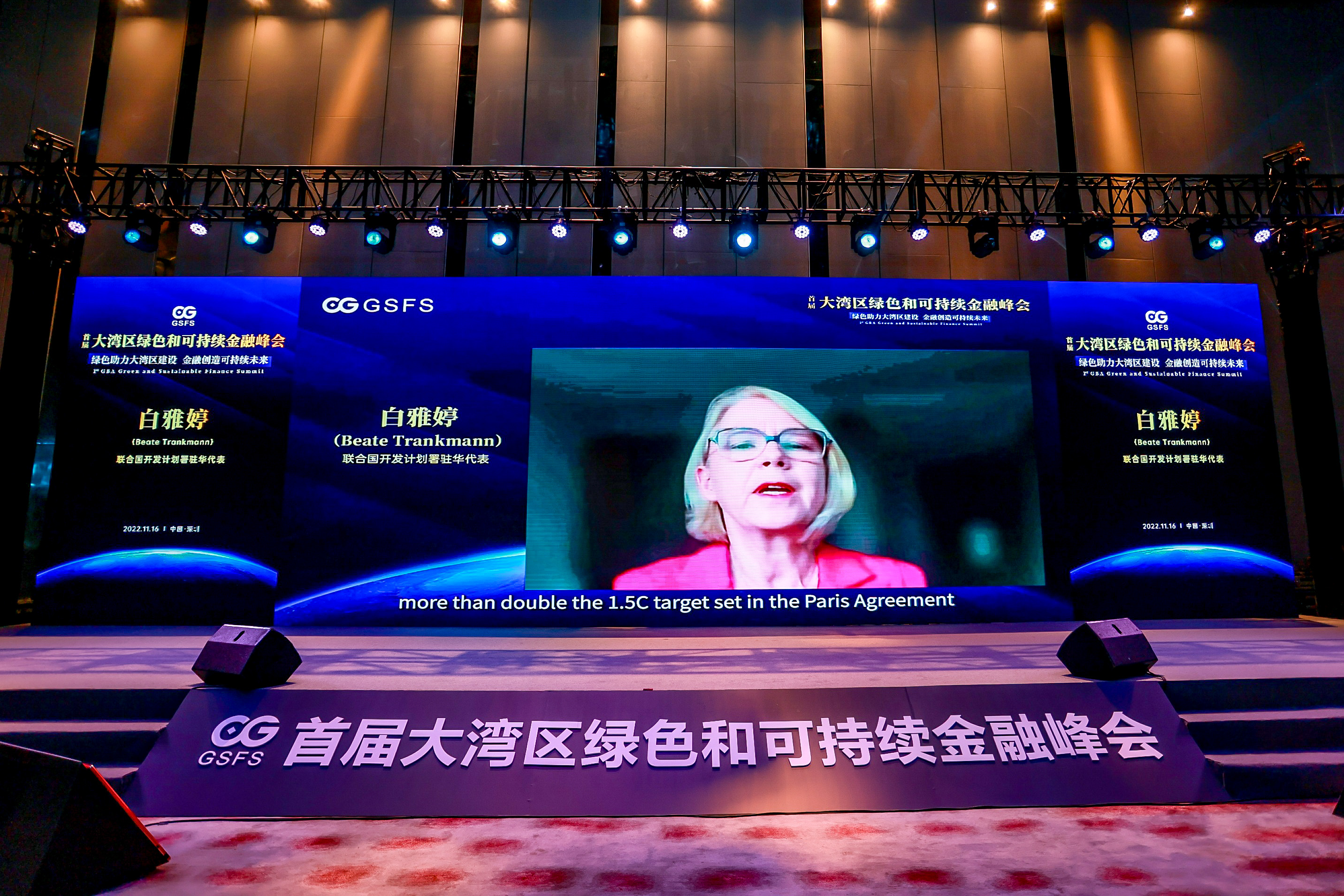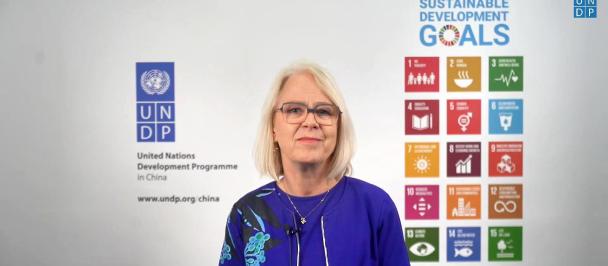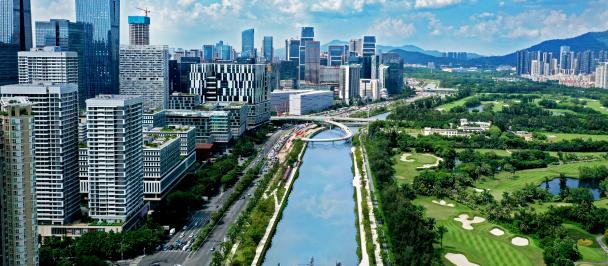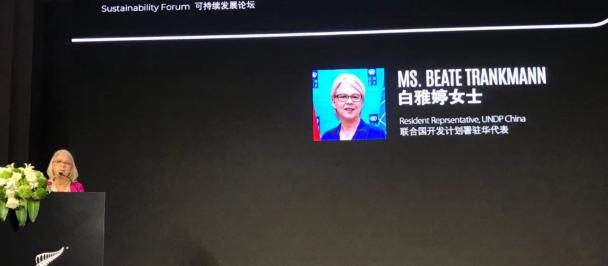Remarks by Ms Beate Trankmann at First Greater Bay Area Green and Sustainable Finance Summit
November 16, 2022

UNDP China Resident Representative Beate Trankmann speaks at the First Greater Bay Area Green and Sustainable Finance Summit
Dear distinguished guests,
Good morning!
On behalf of the UN Development Programme (UNDP), I am pleased to speak at this important event and discuss with you on how to repurpose finance to deliver for people and planet.
30 years have passed since we collectively committed to the UN Framework Convention on Climate Change. Yet, even as world leaders gather in Egypt for the ongoing COP27 climate summit, it is undeniable that we are pushing ourselves closer to, instead of away from, climate catastrophe.
Our current trajectory leads to more than double the 1.5C target set in the Paris Agreement, and by the end of the century, up to 75% of our global population could be exposed to “life threatening” conditions.
If we are to avert this scenario, we need transformative actions now. Every day we wait means more loss of lives and habitats – as well as higher costs to adapt to a harsher environment.
The only way forward is for us to finally embark on a sustainable course and put the global climate agenda as well as the Sustainable Development Goals (SDGs) – to end poverty and save the planet by 2030 - back on track. For this, systematic changes to the financial system are critically important to redirect funding to these priorities.
Contrary to common belief, the key issue is not one of availability of funding, but how finance is being prioritized. Just around 1 percent of global financial assets would be enough to finance the global energy transition. This is not a cost. This is an investment in our collective future.
Allow me now to highlight three areas where immediate action is needed:
First – working together for transparent and accountable impact measurement and reporting to ensure tangible SDG outcomes.
While global ESG assets are expected to exceed 53 trillion dollars by 2025 – equaling one third of total assets under management – concerns are rising from stakeholders about the risk of green and SDG “washing” due to a lack of standardized and reliable disclosure mechanisms.
To address this problem and link investments to actual SDG outcomes, UNDP has developed the SDG Impact Standards and the SDG Finance Taxonomy. These standards help provide a common framework for measuring, authenticating and reporting on the environmental and social contributions of investments.
The New Development Bank piloted our standards in March 2021 and issued the first SDG bond on China’s inter-bank market, worth 5 billion RMB. In addition, NAFMII (the National Association of Financial Market Institutional Investors) has worked with us to develop China’s first pilot on social bonds and sustainability bonds.
We welcome more stakeholders to join our efforts, to incubate best practices, and showcase effective ways to shape responsible business models and disclose responsible investments.
Second – leveraging technology and innovation to accelerate sustainable finance.
The newly released World Energy Outlook by IEA estimates that annual global investment in clean energy will rise over 50% to 2 trillion USD by 2030.[1] However, this still falls short of the 4.4 trillion USD required annually to achieve net-zero.[2] To further scale up investment in the low carbon transition at the speed required, innovative technologies need to be utilized in financial decisions and management.
A case in point is our SDG Investors Maps, a market intelligence tool that we have developed in 20 countries to identify investment opportunities that generate both business returns and development impact. To put them together in China, we have worked with industry leaders and international think tanks, using technologies such as AI and Natural Language Processing as well as Big Data to mine thousands of policy papers and industry plans that feed into the maps.
To learn more about our experience, I invite you to stay tuned for December 15 when we are going to launch our latest SDG Investor Map for China on renewable energy and the circular economy – sectors which are at the heart of its push towards the dual carbon goals.
Third and last – ensuring that the low carbon transition is just and inclusive.
Greening the economy will create many new opportunities but in the short term will also disrupt livelihoods. While green energy jobs could quadruple to 42 million globally by 2050[3], job losses are likely to occur in certain sectors and regions, particularly where dependence on fossil fuels is high and opportunities for economic diversification are limited. Thus, it is crucial to leverage finance to ensure that carbon intensive sectors transition as smoothly as possible and social aspects such as employment generation are linked with financial support to buffer possible negative social and economic shocks.
At UNDP, we believe in a holistic approach to financing all 17 SDGs, leveraging the synergies and interlinkages between them. Our knowledge products and tools are based on a people-centered approach and I am pleased to see this idea gaining momentum in recent policy discussions on “green inclusive finance” and welcome further exchanges and cooperation with you all on this topic.
In closing, let me thank Shenzhen Municipal Financial Regulatory Bureau and the China Alliance for Social Value Investment (CASVI) for organizing this event and inviting me to speak.
The clock is ticking. We have only 8 years left to achieve the SDGs, and the path ahead has many steep climbs. However, by working together and combining the knowledge, tools, and resources we collectively have, we can still succeed in rescuing the 2030 Agenda and safeguarding the future of both people and planet.
Thank you!
[1]https://www.iea.org/news/world-energy-outlook-2022-shows-the-global-energy-crisis-can-be-a-historic-turning-point-towards-a-cleaner-and-more-secure-future
[2]https://irena.org/news/pressreleases/2021/Jun/IRENAs-World-Energy-Transitions-Outlook-Re-Writes-Energy-Narrative-for-a-Net-Zero-World
[3] https://irena.org/newsroom/pressreleases/2020/Apr/Renewable-energy-can-support-resilient-and-equitable-recovery (see full report from IRENA here: https://www.irena.org/-/media/Files/IRENA/Agency/Publication/2020/Apr/IRENA_Global_Renewables_Outlook_2020.pdf)

 Locations
Locations



